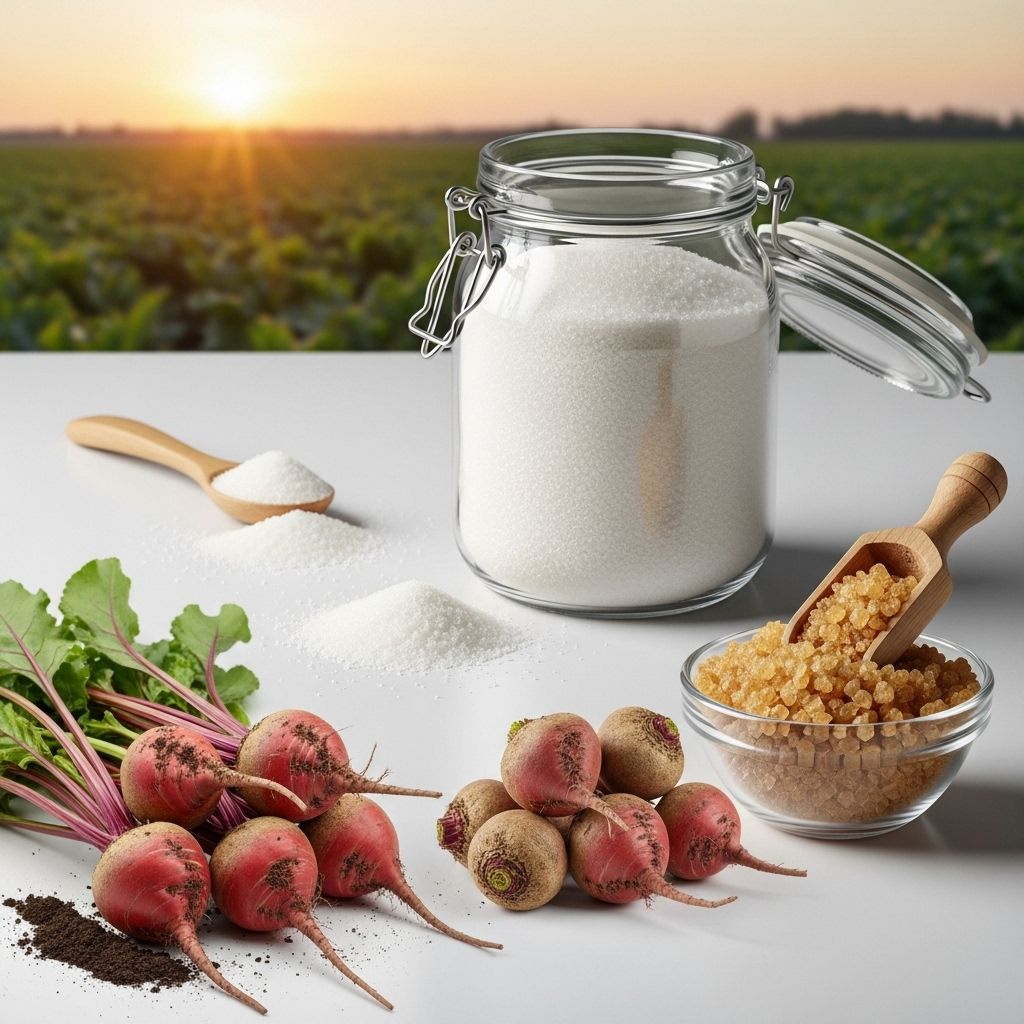What Is Beet Sugar? Exploring Benefits, Uses, and Taste
Beet Sugar: The Sweet and Nutritious Choice

Table of Contents
- Introduction to Beet Sugar
- Processing of Beet Sugar
- Benefits of Beet Sugar
- Uses of Beet Sugar
- Taste of Beet Sugar
- Frequently Asked Questions
Introduction to Beet Sugar
Sugar beets are root vegetables that are primarily cultivated for their high sucrose content, making them a significant source of sugar. Beet sugar, or beet sucrose, is obtained from these beets through a process that includes harvesting, washing, slicing, and extracting the sugar. This process is similar to that of sugar cane, but beet sugar is produced in cooler climates and is a major source of sugar in many parts of the world.
Processing of Beet Sugar
The processing of beet sugar involves several steps:
- Harvesting and Storage: Beets are harvested and stored to maintain their quality before processing.
- Washing and Slicing: Beets are washed thoroughly to remove dirt and sliced into thin strips called cossettes.
- Sugar Extraction: Cossettes are placed in a diffuser where hot water extracts the sucrose, producing raw juice.
- Purification: The raw juice undergoes purification to remove impurities, often involving liming and carbonatation.
- Evaporation and Crystallization: The purified juice is evaporated to concentrate the sugar, which is then crystallized through heating and cooling.
- Centrifugation and Drying: Sugar crystals are separated from the remaining syrup via centrifugation and dried to produce refined sugar.
Benefits of Beet Sugar
Beet sugar offers several benefits compared to other types of sugar:
- Local Production: In many regions, beet sugar is locally produced, reducing transportation costs and supporting local economies.
- Lower Cost: Beet sugar is often cheaper compared to cane sugar, making it a more affordable option for consumers.
- Environmental Benefits: Beet sugar production requires less water and energy compared to some other sugar sources.
- By-Product Utilization: Beet pulp, a by-product of sugar extraction, can be used as animal feed.
Uses of Beet Sugar
Beet sugar is versatile and can be used in various applications:
- Baking and Cooking: It is used as a substitute for cane sugar in recipes, providing the same sweetness.
- Food Industry: Beet sugar is used in the production of chocolates, candies, and beverages.
- Animal Feed: Beet pulp is used as nutritious feed for livestock.
- Specialty Sugars: Different crystal sizes and molasses content can produce a variety of specialty sugars.
Taste of Beet Sugar
Beet sugar is nearly identical to cane sugar in taste and texture, making it a suitable substitute in most recipes. However, some people may notice a slightly different flavor profile due to differences in processing. Beet sugar is often used to produce white sugar, which is 99.9% sucrose, providing a clean, sweet taste without the molasses flavor found in brown sugars.
Frequently Asked Questions
Q: What is the difference between beet sugar and cane sugar?
A: Both beet and cane sugars are nearly identical in taste and composition, but they differ in their source and processing methods. Beet sugar is produced from sugar beets grown in cooler climates, while cane sugar comes from tropical plants.
Q: Is beet sugar healthier than cane sugar?
A: In terms of nutritional content, both beet and cane sugars are essentially the same. However, some prefer beet sugar due to local production and lower environmental impact.
Q: Can I use beet sugar in baking?
A: Yes, beet sugar can be used interchangeably with cane sugar in most recipes, providing the same level of sweetness.
References
- https://en.wikipedia.org/wiki/Sugar_beet
- https://www.sugar.org/blog/refining-and-processing-sugar-beets/
- https://www.youtube.com/watch?v=hizXcJCqmoQ
- https://www.theunbeetableexperience.com/blog/what-is-a-sugar-beet/
- https://www.britannica.com/science/sugar-chemical-compound/Beet-sugar
- https://wsro.org/about-sugar/farm-table/processing-and-refining-sugar
- https://www.sucrose.com/lbeet.html
- https://www.fsa.usda.gov/Internet/FSA_File/sugar_glossary.pdf
- https://www.epa.gov/sites/default/files/2020-10/documents/c9s10-1b.pdf
Read full bio of Sneha Tete












